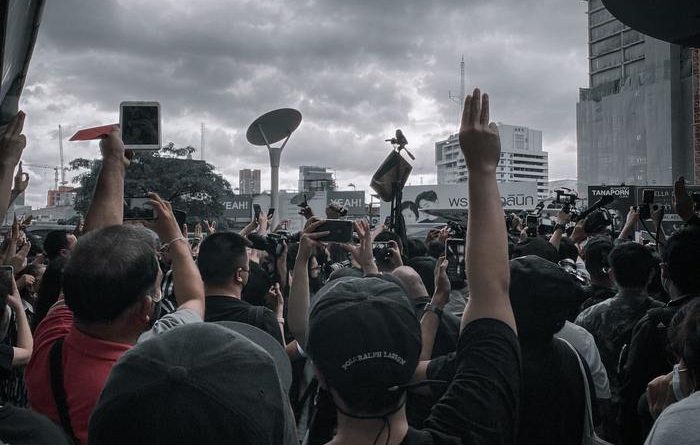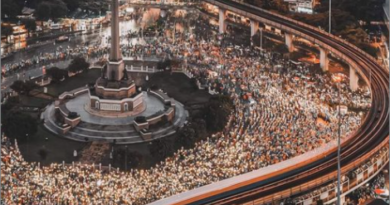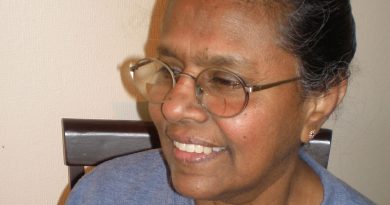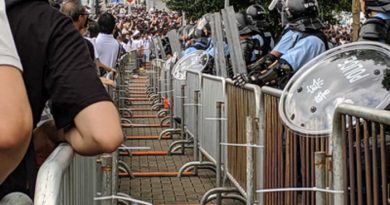The Prelude to a Long Struggle: “Anti-Government-Royal Reform”
Lee Yu-kyung
Thailand’s anti-government royal-reform protests have entered a lull due to the second wave of COVID-19 infections. Nonetheless, anti-government protesters were planning to organize a rally on December 14 last year and bring back their “stronger demonstrations” so they reserved a large public rally until mass infections spread in the Samut Sakhon province at the end of December. On December 30, the Thai government retracted permission for the rally, and the protest leadership also announced its intention to refrain from large-scale outdoor rallies in mid-January.
This doesn’t mean that the Three-Finger Uprising was suspended or that there were no protests. Anon Nampa, a human rights lawyer who was a key figure in the uprising and was named the winner of the Gwangju Human Rights Award in 2021, entered the year-end pause by saying:
“The protests in 2020 are just the ‘prelude’ to the long struggle.”
He said this year’s rallies were the overture to a long struggle. If you recall this, the current situation seems to be interpreted as a period of long-term breathing.
The three demands of the protesters: Prime Minister Pra’s resignation, constitutional amendments, and royal reform. If we understand the situation to be one of ‘rallying’ in the second half of last year when they widely shared the outline of their position and preached about its justification, such as the three major demands and the cause of their uprising, then we can describe the protest method that appears in the new year is ‘Fighting on the Issues’. In other words, we can say that the situation itself has entered the spotlight. The issues on which they fight include the royal blasphemy law (Lese majeste, Article 112 penal code 112) and the Thai government’s COVID-19 vaccine policy. The former is a very natural response to the recent surge in accusations citing the Royal Blasphemy Act, which raises new questions related to transparency and suspicion of preferential treatment. The two issues, the Royal Blasphemy Act and the Vaccine Policy, are two key words that currently permeate Thai society.
Political circles are not free from these two key words either. The reformist Future Forward Party (FFP, the ‘new future party,’ which was launched as a reform party and was forcibly dissolved in February last year) is in a position to include the issue of the royal blasphemy law in the debate on the distrust of the government, with the Pra government facing a no-confidence vote submitted by eight opposition parties for which debate will begin in parliament on February 16, and it is scheduled to be voted on by parliament on February 20. On the other hand, the ruling party Palang Pracharat strongly opposes any mention of the word, “The Royal Family”. Even one lawmaker has emerged who has threatened to accuse all 208 lawmakers who signed the motion of no-confidence of violating the royal blasphemy law. In the middle of this foray there is a pro-Thaksin Pheu Thai party which has given vague answers to the ruling party’s request to remove the “royal” articles from the agenda.
1. Fighting on the issues by abolishing the Royal Blasphemy Act to further the cause of monarchy reform;
The number of people accused of violating the blasphemy law in the past two months has reached 56 as of January 25th. The Computer Crime Act, the cousin of the Royal Blasphemy Act, and the Instigation Act (Article 116) are also targeting critics of the current government. For example, one of the key leaders of the “Three-Finger Uprisings” and a student at Thammasat University, Parit Chiwarak (nickname “penguin”), faces a total of 15 accusations of contempt, including royal contempt, and incitement. The lawyer Anon Nampa and student activist Panusaya Sithijirawattanakul (nickname “Rung”) have received eight charges each.
As the Royal Blasphemy Act cases have surged, the consensus that the abolition of the blasphemy law is fatally important for the completion of monarchy reform seems to have increased. A notable protest against the Royal Blasphemy Act was held near the Victory Monument in Bangkok on 15 January. However, the demonstrations were not organized by Rasadorn or Free Youth, who have led previous anti-government protests. The Thai Enquirer reported that the demonstration was a rally led by an organization called Liberating Guard under the Guardian Democracy’s Network (GD). (GD is an umbrella organization of various groups formed for ‘demonstration security’ during the three-finger protests. The security of the protesters is similar to the group for desperate defense at the Korean demonstration site in the past.
As protestors at the Victory Monument were arrested, the demonstration continued to shift its location in protest of those arrests, and a ping pong bomb (a table tennis ball-shaped bomb) was suddenly fired. About two weeks after that day, on January 29, police said they had arrested three protesters for allegedly dropping ping pong bombs. In a related article, the Thai Inquirer quoted GD founder Tan as saying that the three suspects arrested were former members of the GDN and all of them had left the organization last year. Those who left the organization created a new guard organization called, Special Task, and were involved in the ping pong bomb.
Thailand’s “demonstration security” was always present during past Red Shirt (2009, 2010) protests and Yellow Shirt protests (2008, 2014). There were a few people who were mainly employed for the security of the protest area, the leadership, and the security of the protesters. On the other hand, during the Three-Finger Uprising, protesters tended to organize themselves on the spot. For example, the Vocational School (similar to the concept of Korea’s vocational school in the past), which has been loosely involved in the Three-Finger Uprising, has organized itself as security for protesters as the demonstrations have continued and the use of force by the state has occurred. We Volunteer (abbreviated “WeVo”) is one of its representative organizations. Since then, various security organizations have appeared. The Ping Pong Bomb Incident has now put security groups on alert to be mindful and wary during the Three-Finger Uprising. (For this, see Civil Society Role.)
2. Vaccine policy and the Blasphemy Act
Among the 56 people accused of violating the Royal Blasphemy Act was a former leader of the Future Forward Party, which was forcibly dissolved by the Constitutional Court ruling last February, and he is now a politician, Tanaton Rouangrangkit, who leads the Progressive Movement. He questioned Thailand’s COVID-19 vaccine policy on January 18 via Facebook Live. The transparency of the vaccine policy has been questioned in that Siam Bioscience, which exclusively contracted AstraZeneca’s local production, was owned by the king and was awarded without competitors.
On January 21, after he raised the issue on Facebook Live, the Minister of Digital Economy accused Tanaton of violating the blasphemy law. This began to directly link COVID-19 vaccine policy to the Royal Blasphemy Act. On January 25, the royal reform protest leader “Penguin” demanded transparency for the vaccine policy in front of the headquarters of Siam Bioscience Bangkok. And with his colleagues, they staged flash mob-like demonstrations, which were a new strategy for anti-government protesters.
The ownership relationship of Siam Bioscience is a major issue to consider. The owner of this company is the Crown Property Bureau (CPB), and the CPB is an institution fully controlled by King Wachila Longcon. If you are a normal constitutional monarchy, the CPB should have a quasi-national character as an institution. However, with the revision of the Royal Property Law in July 2017, they opened a little bit of a path for legalizing the king’s CPB control. The following year, the CPB announced on June 16, 2018 that, “all CPB assets will be registered in the name of the king.” CPB assets have now been legally taken into the hands of the king, and today, Thailand’s COVID-19 vaccine policy has come under the auspices of the king.
This is why Tanaton’s earlier issue was not limited to transparency. “The Siam Bioscience, which monopolizes vaccine production, is owned by the king, so if there is a problem in the vaccination process, who can sue the company?” he said in an interview with Al Jazeera, which was reported on Jan. 29. Even if we did not highlight the current situation in which the accusations related to the royal blasphemy law are soaring, the question he asked is still valid. Nevertheless, the Thai government responded with the accusation of violating the royal blasphemy law in raising the rational issue of vaccine company selection, which speaks of the reality in Thailand, where even the COVID-19 vaccine issue emphasizes the necessity of monarchy reform.
King Wachila Longcon has been devoted to privatizing the state agencies that have been given over to him the past few years. For example, he appointed his closest aide, Air Chief Marshal, Satitpong Sukvimol, to the CPB presidency. This CPB president is the chairman of Siam Bioscience. At the time of the announcement that Thailand had decided to produce the AstraZeneca vaccine in October last year, CPB Chairman Satitpong declared that he was aiming for the first vaccination in the middle of next year (2021). Satitpong has also served as chairman of Siam Cement Public Co. Ltd, which has been the largest shareholder (33.3% stake) since August 2018. He is also director of Siam Commercial Bank, which is known as the Royal Bank. These are facts that can illustrate how trustworthy the king is, including how the Wall Street Journal introduced him as, “a business man who leads ten different companies.”
Furthermore, to see how the elites of Thai society such as the royal family, military, and enterprises are networked, please refer to the recently updated Royal Network by “ACT4DEM,” a European network of Thai activists. ACT4DEM published an update on the Royal Network Configuration of the Royal Security Command in December last year. (click on the link below)
* https://thaipoliticalprisoners.files.wordpress.com/2021/01/kings-command.jpg
3. Thailand’s haunting trauma Abduction turned Arrest: could amount to enforced-disappearance.
The aforementioned Royal Blasphemy Law is a ‘revenge’ of the vested interests against anti-government royal-reform protests in a broad sense. However, if this ‘revenge’ still has the pretext of using the law, ‘abduction-turned-arrest’ or ‘abduction-styled arrest’ against the protesters is a very dangerous retaliatory form of state violence. The kidnapping controversy has included three cases in January alone.
First, on the night of January 13, reports emerged that Sirichai Nathang, a student at Thammasat University, was taken by plainclothes agents who came into the dormitory without arrest warrants. After this, news broke for several hours, raising concerns about forced disappearance. Putting together the news from Thai media and social media, police did not tell him where he was taken into custody, and acquaintances and lawyers appeared to have been searching for his whereabouts during the night. The Khaosod English News reported that he was charged with violating the Computer Crime Act after 24 hours that included arrest-release and a re-arrest from the time he was taken by plainclothes agents. The refusal to provide computer passwords to the investigation authorities violated the Computer Crime Act.
To give background on his abduction, he had sprayed the royal family portraits, which were common in the streets, spray painting the phrase, “Abolish the Royal Blasphemy Act.” The news did not deny this. But reports showed that the portrait he sprayed was of the former Pumiphon king couple, who died in 2016, and Princess Shiriwarawari (the daughter of the current king). Article 112 of the Criminal Code, the Royal Blasphemy Act, is a clause prohibiting the defamation of the current king, the current queen, and the current crown prince. The characters in the large portraits are not protected by this clause, of course, many cases of the Royal Blasphemy Act do not connect to the actual law of Article 112 of the Criminal Code.
The second kidnapping involves a member of the Free Guards, Tosathep Duangnate (Nickname “Art”), one of the protesters’ security groups. He was abducted by plainclothes agents on the night of January 15th, when he participated in a rally to abolish the Royal Blasphemy Act, and was detained for more than 48 hours without an arrest warrant. According to The Nation, the delegation of Wibo (WeVo), a group of protesters who were tracking his whereabouts, he was released only after they protested to the police.
The third case of kidnapping is the case of Monkhol Santimethakul (the nickname “Yel”), which remains a controversial case. He allegedly noticed his keys were lost when he moved away from the protests on January 15. At this time, a group of men approached him to help him find the keys, and when he was out of public view, they forced him into a car to take him somewhere. He was detained overnight incommunicado (out of touch), and they dropped him off at the place where the same group “knocked” him the next morning, Yell explained. But the police ordered him to call his claim fake, and the kidnapping of Yell remains visible as a “controversy” as his argument and the police’s arguments are sharply at odds.
These series of events, including kidnapping, kidnapping style arrests, forced disappearances, and mixed claims of the abducted and state power – even if Yell’s case is left as “disputed” – are ominous omens. It has certainly instilled the fear of ‘abduction’ or ‘abduction style arrest’ in civil society, and someone has intended for this effect to appear.
Thailand is a society that has historically been subjected to the trauma of abduction and forced disappearance. According to the 2018 report of the United Nations Working Group on Enforced or Involuntary Disappearances (also referred to as “Working Group”), Thailand has reported a total of 82 cases of forced disappearances since the 1980s. There is no need to go far into the past to find them. The incident that became the fuse of the current Three-finger Uprising was the kidnapping and forced disappearance of Thai exiled activist Wanchaliam Satsaksit in broad daylight in Phnom Penh, Cambodia, on June 4 last year. There are a total of nine asylum Thai activists who have been forcibly disappeared since the 2014 coup; Thailand still has no law prohibiting torture and forced disappearance. The 2016 public statement led to actions two years later, in July 2018, when the Justice Department established a Sub-committee on the Prevention of Torture and Enforced Disappearance Cases and “appointed three panels dealing with forced disappearances and torture issues.” Yet there is no record of any activity by the committee since then. Thailand has not yet approved the International Convention for the Protection of All Persons from Enforced Disappearance.
(https://www.ohchr.org/en/hrbodies/ced/pages/conventionced.aspx)
4. Discussion of the Lawyers’ Association’s on the revenge against human rights Attorney, Anon Nampa
Recently, it was reported that the Thai Lawyers Council of Thailand (LCT) decided to discuss disciplinary action against human rights lawyer Anon Nampa, a pivotal figure in the royal reform protest. The Association of Thai Barians claimed that Anon Nampa was hostile to the King and the royal family and instigated hatred (“inciting hatred”), and they accepted a third party’s petition and formed an investigation committee. The petition, which is aimed at the Anon Southpa in full, was reportedly submitted by Apiwat Kanthong, secretary of the Prime Minister’s Office, Anucha Nakasai, on 13 January.
According to a January 28 report in the Khaosod English News, Panya Jarumas, a spokesman for the LCT, stressed, “the LCT has the authority to investigate whether members of the LCT have acted against Article 18 of the LCT Rules. The Disciplinary Discussion of the Anonnamites is a reference to the LCT Rule 18, which states that, “lawyers should not violate morality or do anything that would undermine their dignity and reputation as lawyers.” Koreeyor Manuchae, chairperson of the Human Rights Lawyers Association of Thailand, said she had filed a petition against the LCT, saying that they should dismiss the petition aimed at Anon Nampa. But her petition was not accepted.
5. Civil societies’ role
It’s the hardest question. I write briefly my suggestions, even if it is not the level of answers I suggest.
First of all, the civil society of Thailand has a difficult task to manage this fire properly so that it does not diminish the power of rallies and associations that have entered into a lull. The reality that the Royal Blasphemy Law and crimes of incitement are overturned is that the longer the lull, the more aggressive will the counterattack be of vested interests using judicial power can paralyze the movement and the protest leadership. In addition, fear and helplessness can gradually increase among ordinary citizens. I propose what it would be possible to intermittently and continuously plan something like non-face-to-face resistance actions, which may be a new tactic in the era of infectious diseases.
In addition, it seems necessary to supplement the weaknesses of the movement without centralized leadership. If the number of organizations increases due to amoeba-style dispersion, situations and areas that are difficult to control can occur. The ping pong bomb case revealed that. The Three-Finger Uprising led to the free and voluntary participation of an unspecified number of individuals and organizations when the theme was presented without a centralized organizational system or leadership. On the other hand, it is necessary to prepare and cope with the phenomenon of contingency, unpredictables, a problem of loose cannon and fragmentation of power.
When we move to the Korean civil society, Korea is directly involved in the issue of the Royal Blasphemy Law; and therefore, we cannot help but mention our responsibility.
The 518 Foundation awarded the Gwangju Human Rights Award to Jatupat Boonpattaraksa (nickname “Fi” or “Fi Dao Dean”), who was indicted on the Royal Blasphemy Act in 2017. The following year, in 2018, a student activist, Chanoknan Luamsap, who received a subpoena for violating the Royal Blasphemy Act and fled to South Korea, was recognized as a refugee in Korea. In 2021, the Gwangju Human Rights Award also went to human rights lawyer Anon Nampa. Now that the accusations of the Royal Blasphemy Act have surged and the issue of abolishing the law has emerged as a key issue of the demonstration, Korea, especially civil society, has a duty and responsibility to show strong and clear words of solidarity, in writing and actions.
Despite various blind spots and criticisms both inside and outside the country, Korea is still a society with a strong foundation for civil society. The strong civil society is a desirable condition for international solidarity, as it is possible to unite free citizens against a frame of violation of sovereignty, foreign intervention, and political intervention.
* Lee Yu-kyung is a freelance journalist who has been writing and photographing international disputes and human rights issues. Currently, the Korea Daily is publishing various analysis articles on disputed issues in the global village in the planning section of the “World Dispute Area” and is delivering Thai news on KBS Radio <Unification Train> program. (Personal website: penseur21.com)




